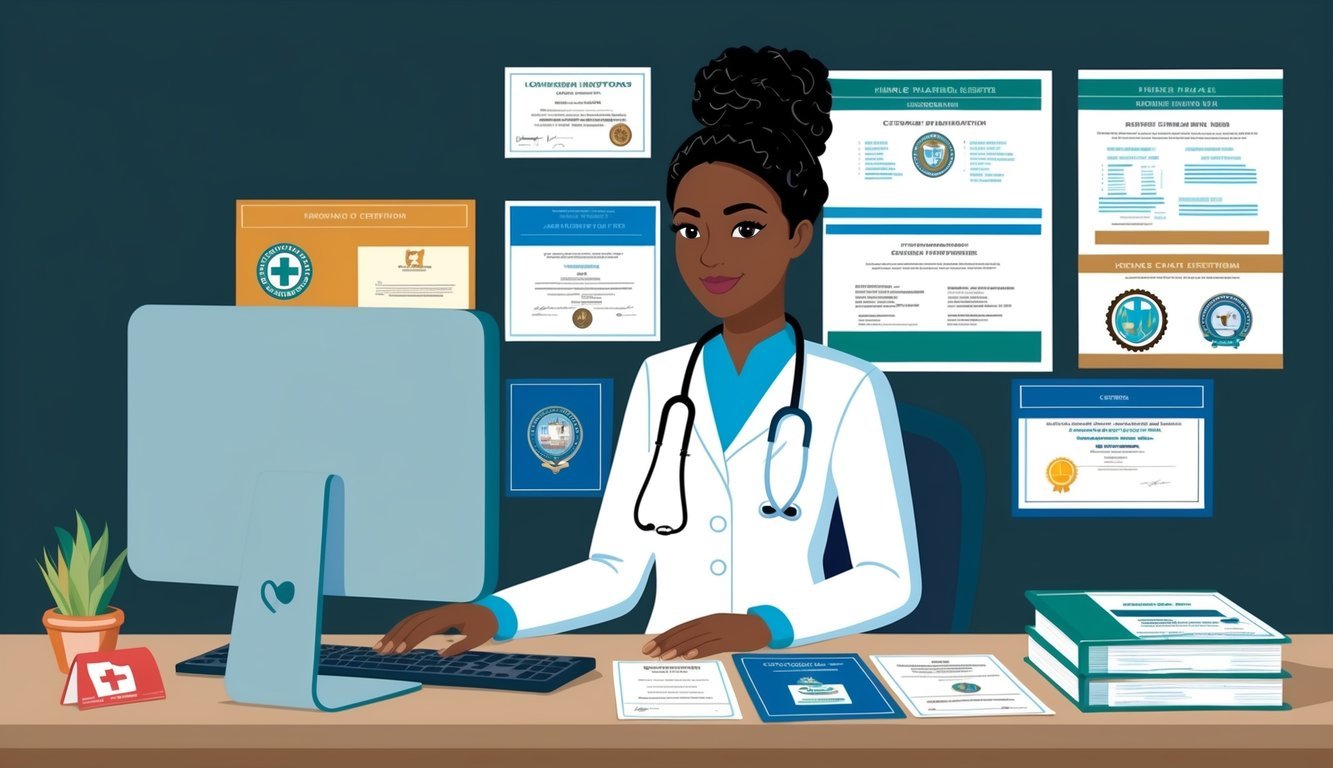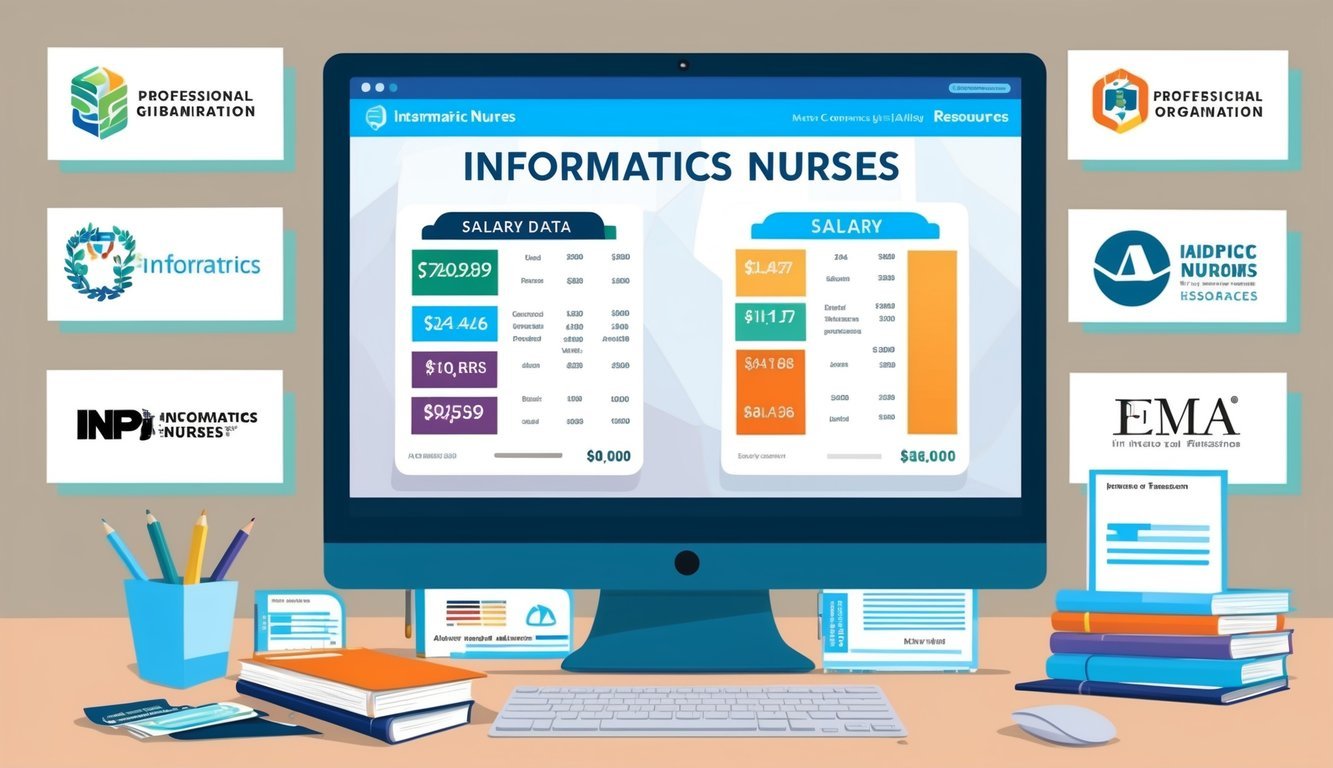As the healthcare industry continues to evolve, the role of an informatics nurse has become increasingly vital.
You may wonder what an informatics nurse salary looks like in today’s job market.
The national average salary for a nursing informatics specialist is approximately $134,219 per year, with most earning between $104,000 and $174,000.
Informatics nurses not only improve patient care through the effective use of information technology, but they also enjoy competitive salaries that reflect their specialized skills.
A recent survey indicates that a significant percentage of informatics nurses are earning above $100,000 annually, highlighting the demand for this unique blend of nursing and IT expertise.
Whether you are considering entering the field or looking to advance your career, being aware of the salary landscape can guide your professional journey.
The data you find can assist in setting salary expectations and negotiating your worth in the job market.
Explore more about the nursing informatics salary in your area to see where your skills may take you.
Understanding Informatics Nurse Roles
Informatics nurses play a crucial role in optimizing healthcare delivery through technology.
They bridge the gap between clinical practice and information systems.
Their expertise ensures that electronic health records (EHRs) are used effectively to enhance patient care.
Key Responsibilities:
- Manage and analyze healthcare data
- Implement and maintain health information systems
- Train staff on electronic medical records (EMR) usage
- Design workflows that improve efficiency
Informatics nurses work with various healthcare technologies.
These include health informatics tools that promote data-driven decision-making.
They ensure compliance with regulations regarding patient data privacy.
Skills Required:
- Strong understanding of nursing practices
- Proficiency in information technology
- Analytical thinking for data interpretation
- Excellent communication skills
As you advance in this field, continuing education is vital.
Certifications in health informatics can enhance your qualifications and increase your earning potential.
According to the HIMSS Nursing Informatics Workforce Survey, around 60% of nursing informaticists earn salaries over $100,000 annually.
This demonstrates the growing importance and value of informatics roles within healthcare.
For more details on salary trends, you can explore the Nursing Informatics Salary Guide and other relevant resources.
Education and Certification

Your pathway to a successful career as an informatics nurse hinges significantly on your education and certifications.
These credentials not only enhance your skills but also improve your employability and salary potential.
Nursing Informatics Certification
To validate your expertise, you should consider obtaining the Nursing Informatics Certification from the American Nurses Credentialing Center (ANCC).
This certification demonstrates your proficiency in managing patient data, information systems, and applying technology to nursing practices.
Eligibility typically includes holding an active RN license and possessing a master’s degree or higher in nursing or a related field with informatics coursework.
After fulfilling prerequisites, you must pass a comprehensive exam, which will bolster your credentials and potentially lead to higher-paying roles.
Degree Programs
Pursuing a degree is essential for a career in nursing informatics.
Many universities offer specialized programs that cover essential topics such as data management, health information systems, and clinical decision-making.
You can opt for graduate degrees like a Master of Science in Nursing (MSN) with an informatics focus.
This degree equips you with advanced knowledge and skills tailored for the informatics landscape.
Additionally, there are numerous online nursing informatics programs that provide flexibility for working professionals.
These programs make it easier to balance your studies with existing commitments while progressing your career.
Continuing Education
As technology evolves, ongoing education is vital in maintaining your competitive edge.
Engaging in continuing education courses allows you to stay updated with the latest trends in nursing informatics and best practices.
You may find specialized workshops, webinars, or online courses focusing on topics like electronic health records (EHR) or data analytics.
Some institutions even offer tailored programs to meet specific needs within the healthcare sector.
This continuous learning not only enriches your skill set but can also play a role in advancing your career opportunities in the field.
Salary Information
Understanding the salary landscape for informatics nurses is essential for those considering or advancing in this career.
Several factors influence salaries, including location, experience, and education level.
Factors Affecting Salaries
Numerous elements can impact your salary as an informatics nurse.
Key factors include:
- Specialization: Nurses with additional expertise in specific technologies may command higher salaries.
- Employment Type: Salaries can vary significantly between those working in hospitals, healthcare companies, or consulting roles.
- Certification: Holding certifications like the Certified Informatics Nurse (CIN) can lead to better pay opportunities.
According to Payscale, the average nursing informatics salary is around $84,610, but the range can be from approximately $61,000 to $98,000 annually.
Geographical Variations
Your location plays a crucial role in determining your salary.
Here’s a breakdown of average salaries across various states:
| State | Average Salary |
|---|---|
| California | $95,000 |
| Texas | $80,000 |
| New York | $90,000 |
| Florida | $78,000 |
| Illinois | $85,000 |
Proximity to metropolitan areas often correlates with higher salaries due to increased demand and cost of living adjustments.
States like California and New York typically offer the highest salaries for nursing informatics professionals, as noted by Nurse.org.
Experience and Education Levels
Your level of experience and education significantly affects your earning potential.
Entry-level informatics nurses can expect starting salaries around $74,410, increasing significantly with experience.
- Entry-Level: Approximately $74,410
- Mid-Career: Around $84,610
- Experienced: $100,000 or more
Higher education, such as obtaining a Master’s degree in Nursing Informatics, can also elevate your salary potential.
According to the HIMSS Nursing Informatics Workforce Survey, 60% of informatics nurses earn salaries above $100,000, underscoring the financial benefits of education and experience in this field.
Career Outlook and Opportunities

The field of nursing informatics presents promising career prospects, driven by advancements in healthcare technology.
Opportunities for specialization and leadership roles are expanding, making it a strategic choice for those in the nursing profession.
Job Market Trends
The demand for nursing informatics professionals is growing significantly.
According to the HIMSS 2023 Nursing Informatics Workforce Survey, approximately 60% of informatics nurses earn over $100,000 annually.
In addition, the national average salary for nursing informatics specialists is around $134,219 per year, with a range from $83,000 to $218,000.
Here’s a quick overview of salary expectations:
| Salary Range | Annual Income |
|---|---|
| Entry-Level | $74,410 |
| Average | $134,219 |
| High Earners | $218,000 |
Healthcare institutions increasingly recognize the value of informatics experts, leading to numerous job openings in various settings.
High job satisfaction rates in this career path also enhance its attractiveness.
Leadership Roles and Advancement
As you advance in nursing informatics, leadership opportunities become more accessible.
Roles such as Chief Nursing Officer and Clinical Informatics Manager are among the positions you could aim for.
Such roles not only come with increased financial rewards but also allow you to influence healthcare practices significantly.
Skills learned in nursing informatics can pave the way for leadership training programs, further enhancing your career.
The focus on improving patient care through technology leads to increased responsibilities.
This makes this career path not only lucrative but also impactful in shaping future healthcare delivery.
Professional Organizations and Resources

Engaging with professional organizations and utilizing key resources can significantly enhance your career in nursing informatics.
These entities provide networking opportunities, access to research, and ongoing development resources, crucial for staying updated in the field.
Nursing Informatics Associations
There are several prominent associations dedicated to nursing informatics.
Joining these organizations can provide you with valuable resources and networking opportunities:
-
Healthcare Information and Management Systems Society (HIMSS): HIMSS is focused on improving health through IT. They offer numerous resources, including the annual HIMSS Nursing Informatics Workforce Survey, which provides insights into salary trends and workforce data.
-
American Medical Informatics Association (AMIA): AMIA promotes the development and use of informatics in health care. Their conferences and publications keep you informed about the latest research and best practices.
-
Alliance for Nursing Informatics (ANI): This group fosters collaboration among nursing informatics professionals and provides resources for workforce development, advocacy, and education.
Engaging with these organizations can enhance your professional network and offer opportunities for mentorship.
Annual Surveys and Reports
Annual surveys and reports are critical for understanding salary trends and job satisfaction within nursing informatics.
For instance, the HIMSS 2023 Nursing Informatics Workforce Survey revealed that:
- 60% of informatics nurses earn above $100,000.
- The number of professionals earning between $101,000 and $150,000 has increased significantly over previous years.
These surveys highlight trends and help inform your salary negotiations and career decisions.
Keeping updated with such reports strengthens your knowledge of the industry’s landscape.
Continued Professional Development
Continued professional development (CPD) is crucial for advancement in nursing informatics.
Engaging in CPD can include certifications, workshops, and seminars focused on the latest technologies and management strategies.
Certifications such as the Informatics Nursing Certification (RN-BC) from the American Nurses Association can enhance your credibility and skills.
Additionally, workshops offered by organizations like HIMSS and ANI can provide hands-on experience with current technologies and project management practices.
Participating in webinars and online courses can also be beneficial.
They provide flexibility and allow you to learn at your own pace.
They are also usually accessible from anywhere.
Actively pursuing CPD ensures that you remain competitive in the evolving field of nursing informatics.

